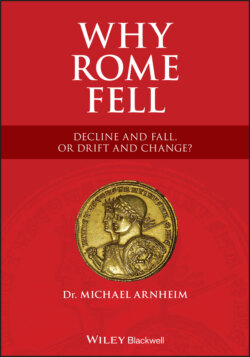Читать книгу Why Rome Fell - Michael Arnheim - Страница 34
The Transmogrification of an Equestrian
ОглавлениеThe historic figure who is usually referred to as “Augustus” was born in 63 BCE into an equestrian family (i.e. the second rank, below that of senator). with the undistinguished name Gaius Octavius. In 44 BCE, on adoption in his great-uncle Julius Caesar’s will, he immediately took his adoptive father’s name: Gaius Julius Caesar. It was usual for an adoptive son to tack his own original nomen (name), in this case “Octavius,” on to his new name as an additional cognomen (surname), often in adjectival form, so: “Octavianus.” That is why he is generally referred to by modern historians during this period of his life as “Octavian”, but he is not known ever to have used the name “Octavianus” himself. To his contemporaries, he was known simply as “Caesar,” and this was his greatest asset with the masses as it enabled him to capitalize on his adoptive father’s popularity. Moreover, besides having been a charismatic champion of the people, Julius Caesar was now a divinity, having been deified shortly after his death. So, in 42 BCE, the next step in Augustus’s transmogrification was to add Divi Filius (son of a god or son of the divine (Julius)) to his name, which now became: Gaius Julius Caesar Divi Filius. In 38 BCE, in a masterstroke, both his forename “Gaius” and his clan name (nomen gentilicium ) “Julius” were ditched and replaced by Imperator (commander), the victory title by which a successful general was hailed by his troops on the field of battle. This gave him a new identity: Imperator Caesar Divi Filius. But the culmination of his reinvention of himself came in 27 BCE when he was accorded by the Senate the title Augustus (the Sublime or the Revered), a sobriquet associated with Romulus, Rome’s mythical founder. He then emerged in his full glory as Imperator Caesar Divi Filius Augustus.
Taking each component of this nomenclature separately:
Imperator: As Augustus tells us in his masterly autobiography, which came to be known as the Res Gestae Divi Augusti, he was hailed as imperator twenty-one times (RG §4). This was the traditional way in which a successful general was honoured by his troops on the field of battle. But, in a master stroke, he now adopted it as a forename. This designation, which came later to be used to mean emperor (and has given us the English word “emperor”), is the reason that the whole regime instituted by Augustus came to be known in English (and similarly in the Romance languages) as the Roman Empire. Because Roman emperors had never had the title of king, when Napoleon Bonaparte assumed monarchical powers he chose to call himself not king but emperor, which did not offend against his republican sensibilities as heir to the French Revolution.
Caesar: This is the only part of Augustus’s final designation that was an actual name: Julius Caesar’s cognomen. But it also became a title, later accorded to the emperor-designate and later still to a “junior” emperor, with the title Augustus reserved for “senior” emperors. It is the origin of the Russian imperial title Tsar or Czar and German Kaiser, and hence Kaiserzeit for the whole period ushered in by Augustus’s accession to power.
Divi Filius: Being the son of a god was no mean feat, but Julius Caesar was reputedly already of divine stock before his deification as a descendant of the goddess Venus Genetrix, whose image accordingly appears on coins issued by earlier members of the Julian gens (clan). The Julii traced their descent from Venus through Iulus, the son of Aeneas, the mythical Trojan prince who was an ancestor of Romulus, the eponymous legendary founder of Rome. It was partly to celebrate this tradition that Vergil wrote his Aeneid.
Augustus: This designation meaning “the Sublime one” or “the Revered one,” associated as it was with Romulus, gave the whole carefully crafted new self-image an aura of sanctity, and hinted at Augustus’s claim to be the second founder of Rome. Augustus himself was to be deified on his death as were most of his successors. The jovial Emperor Vespasian (r. 69–79) famously quipped on his deathbed, “Oh dear, I think I’m becoming a god.” (Suetonius, Vespasian, 23.4.) The deification of the emperor became the basis of the Imperial Cult, which was eventually extended to worship of the genius (attendant spirit) of the living emperor and, especially in the Eastern provinces, of the living emperor himself as well.
